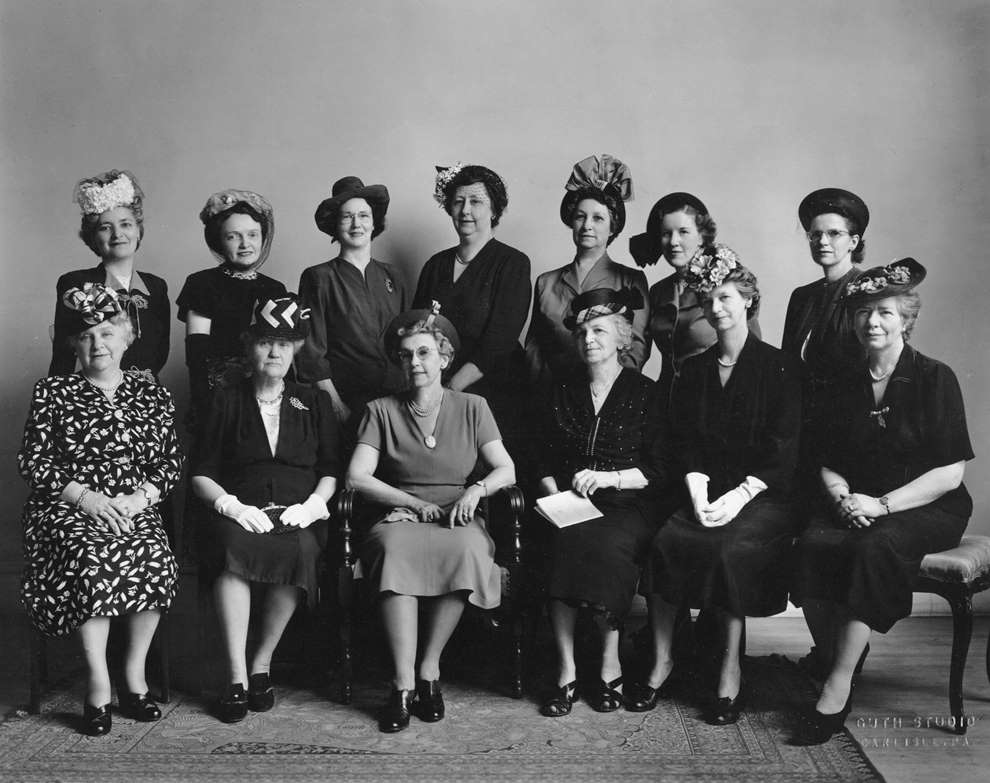Jonas E. Warrell – Businessman, Civic Leader, Benefactor
Jonas E. Warrell was born April 3, 1896 in Conshohocken, Pennsylvania to Albert and Anna Daley Warrell. He graduated from Conshohocken High School in 1913 and attended Drexel University.

Photo portrait of Past Presidents of Carlisle Civic Club including Helen H. Stevens in the back row third from left (23C-14-01).
Born in Chicago on September 18, 1902, Helen Stevens was a long-time and very active member of the Carlisle community, whose life work was associated with finding assistance for individuals needing mental health services. She was deemed "the grandmother of mental health services in Carlisle."1
Helen's parents, Henry and Florabell Smith Huber, provided models for Helen, who stated, "the tradition of my family was to help other families whenever the need arose. From time to time, my parents took in children in need. That was the difference between welfare in those days and now."2 Helen lived in Chicago during a period of active social reform, including the establishment and growth of Hull House, and she was certainly aware of Jane Adams and other activist women who were involved with welfare causes. Many of these women were students and alumni of the University of Chicago, Helen's own alma mater. She graduated in 1925 with dual degrees in English and Social Science. Following graduation she worked as a statistician for the university, compiling information on the mental health care provided in Chicago for a publication.
In 1926, Helen married Allen J. Stevens, a resident of Carlisle, Pennsylvania. The couple later had one son, Huber. At the time of their marriage, Stevens operated a shoe store in town, but later became a postal clerk. In 1940, Stevens was appointed Postmaster for Carlisle, but was soon granted long-term leave to serve with the National Guard during World War II. In 1946, he returned to the postmaster position, which he held until 1967.3 Helen became involved with various organizations in Carlisle, joining the Carlisle Civic Club in 1927. She served on that organization's Welfare Committee. The committee became the Welfare Association and then grew to become Children and Family Services.4
Helen was the consummate volunteer and "regarded no task as belittling if it were needed. She was unusually sensitive to the very special needs of the mentally ill."5 As "her" agency continued to develop, becoming the Family Guidance Clinic, and then the Carlisle Counseling Service in 1977, Helen maintained her high level of interest and involvement. In 1979, the organization was named the Helen H. Stevens Community Mental Health Center in recognition of her great influence; the name has since been abbreviated to "the Stevens Center." There were many lean years with no funds to support a staff for the center. Helen served as the unpaid director from 1957 through 1967. In this capacity, she managed programs and solicited donations and funding.6 During the 1970s, Helen Stevens served on the first committee formed as the Tri-County Mental Health Board for Cumberland, Perry, and Dauphin Counties.
Helen passed away on April 21, 1994 at the age of 91. During her lifetime in Carlisle, she lived in houses on Pomfret and Graham Streets, and on Devonshire Drive. She spent sixty-eight of her years involved with seeking to help those in need find the resources for assistance. At the time he was CEO of the Stevens Center, Charles Currie stated, "We were taken with her first-hand knowledge of mental health and how well she articulated the needs of the clients. She recognized the role that volunteers could play in mainstreaming the mentally ill individual back into the community after institutionalization."7
Jonas E. Warrell was born April 3, 1896 in Conshohocken, Pennsylvania to Albert and Anna Daley Warrell. He graduated from Conshohocken High School in 1913 and attended Drexel University.
[1]Article, Sentinel, April 22, 1994.
[2] Lynn Shultz "Center and Points," News from the Stevens Center, summer 1994.
[3] Record of Appointed Postmasters, 1832-September 30, 1971, National Archives and Records Administration, Washington, D.C., Roll #1, Archive Publications #: M841.
[4] Obituary, Sentinel, April 22, 1994.
[5] Shultz.
[6] Ibid.
[7] Ibid.